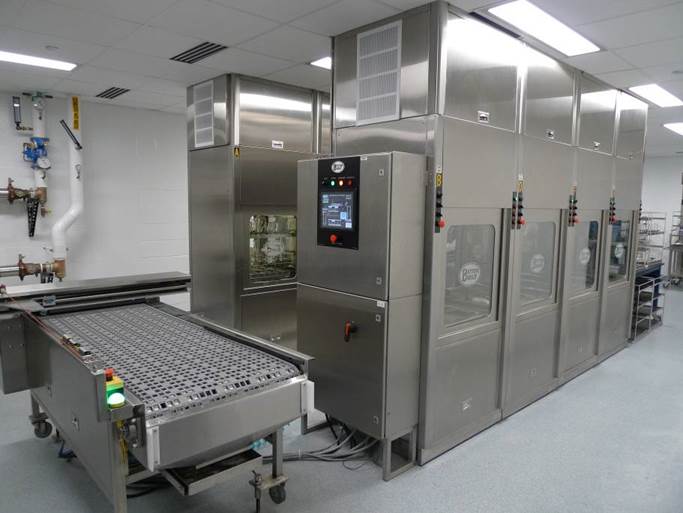Laboratory glassware can be extremely fragile, making it difficult to properly clean. As well, it must be thoroughly sanitized at high temperatures– but can easily chip or crack if the water pressure is too high. For this reason, a specialized laboratory glassware washer is a crucial piece of equipment for anyone working in life sciences and laboratories. It provides a perfectly balanced cleaning process that is effective yet gentle.
There are numerous factors to consider when buying a laboratory glassware washer – as this can be a major investment. Purchasing the wrong size/type or choosing a model that lacks specific, necessary features can cause damage to the lab equipment.
In order to narrow down the options and find the perfect laboratory glassware washer, there are a few questions that must be answered. Let’s discuss.
1. What Standard Operating Procedures Must be Met?
Laboratory glassware washers can be customized to accommodate specific types of lab equipment or to adhere to specific sanitization standards. So, you will need to clarify these standard operating procedures of which the washer must fulfill to purchase the best glassware washer.
Consider the following questions:
a) What Are The Essential Elements That Your Glassware Washer Must Provide?
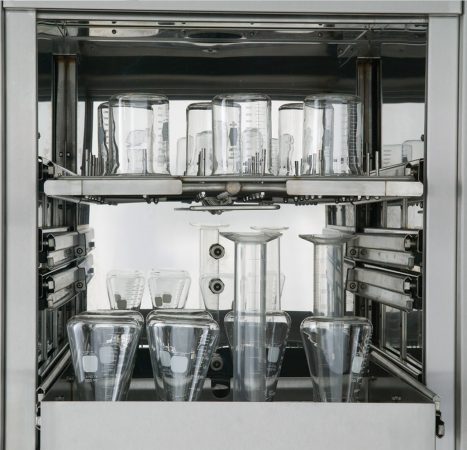
You will need to determine the range of shapes and sizes of laboratory glassware that will be placed in this washer. All lab glassware needs to be held securely inside of the washer to prevent it from breaking. You may need to purchase a washer with interchangeable racks to accommodate specific equipment.
b) Where Will The Glassware Washer Be Installed?
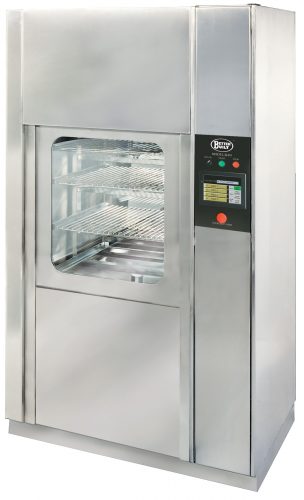
The physical layout of your laboratory will influence the styles and designs of the glassware washer you should purchase. If you have a large space, then a single or double door washer will be optimal, especially if you have large amounts of lab glassware to clean. However, if space is limited, consider an under-counter glassware washer. This is a more compact design that takes up less space – but typically has a more limited capacity.
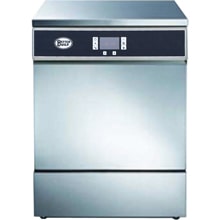
c) Are there Specific Temperatures and Features Needed to Meet Sterility Standards?
The contamination level of your laboratory equipment is another deciding factor. For some labs, glassware needs simple decontamination with hot water and a cleaning solution. However, others will require a deeper cleaning for highly contaminated glassware or to remove residue from sticky or hardened products.
In this case, consider additional cleaning features such as multiple detergent pumps for product distribution and high-pressure sprays.
d) Will The Washer Only Be Used For Glassware?
The majority of laboratory washers are designed specifically for lab glassware, such as beakers, test tubes, cylinders, and bottles. Some glassware washers can be used to clean plastic materials as well. However, the water temperature must be adjustable so that the plastic does not warp or melt during the cleaning process.
Washing disposable plastic pieces can cut waste and spending by up to 50% for laboratories – so having this option is certainly something to consider.
2. What Speed And Efficiency Requirements Are Optimal?
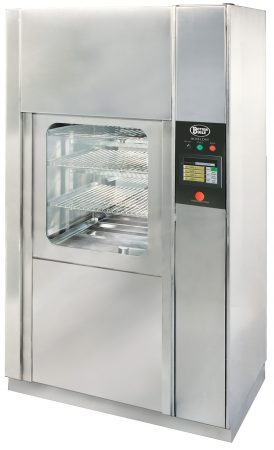
Consider your daily needs that the laboratory glassware washer needs to fulfill. The cleaning cycle for these washers typically ranges from one to three hours. So, if you require a quick turnaround on equipment, you should consider a model with a shorter washing cycle and drying options to speed up the process.
Some of the latest models are designed to maximize efficiency while conserving water and energy – without compromising performance and sanitation. For instance, the G403PT Double Automatic Door Washer utilizes the Activ Automated Glassware System (AGS) to automatically load and unload modules after the cleaning is completed. It also uses rotating spray arms to maximize coverage while conserving water.
This type of technology is certainly something to consider if your washer will need to run continuously. Automation features reduce the time it takes to swap out loads.
3. Is The Washer Sold As A Package or Shell?
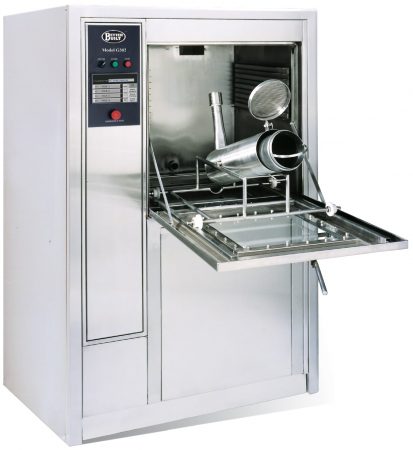
Laboratory glassware washers can be purchased either as a completed set or as a “shell.” A package glassware washer comes with both the washer and shelving all in one. Generally, these shelving and racks will be standardized options that are designed to fit a range of lab glassware. However, they may not accommodate specific pieces based on their size or shape.
A shell glassware washer will not come with racks, so you can purchase them as needed. This is the ideal option for specialized equipment. Shell laboratory glassware washers may also come with customizable add-on options, such as built-in vented or non-vented drying packages or rotary arm spray racks.
4. What Add-Ons Do You Need?
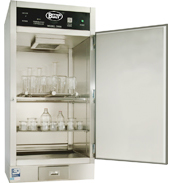
Before making a final decision when buying a laboratory glassware washer, you will want to weigh your options for related accessories and equipment. For instance, if you require a fast turnaround for equipment washing, consider purchasing a glassware washer with drying features or a separate dryer or dry heat sterilizer.
Some of the latest technology can also be beneficial to meet lab requirements or improve overall efficiency. For instance, the G236D Undercounter Glassware Washer has a microprocessor-controlled LED display to modify cleaning programs with specific temperature, detergent use, and timed cycles. It also comes with a communication port to create performance reports.
If the quality of your water source is not up to par, you should add on a water purification and filtration system. A water softener system can also be installed into some glassware washers to remove regenerating salt particles.
Conclusion
Laboratory glassware washers play an important role so a lot of thought and consideration needs to go into the purchasing process. But ultimately, you need to purchase from a manufacturer with the quality you can trust – no matter what your needs are.
At BetterBuilt, we strive to offer only the highest quality laboratory glassware washers and equipment. We have a wide range of washers, options, and sizes. We have worked for over 70 years with life sciences and healthcare laboratories to provide efficient and effective washers with reliable performance.
To learn more about BetterBuilt’s equipment or to place an order, contact our knowledgeable sales team today.

